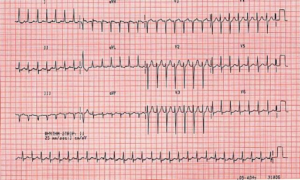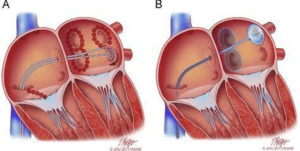If you’ve ever asked, “what is atrial flutter?” this overview will explain the basics, its symptoms, and how it’s managed. Simply put, atrial flutter is an abnormal heart rhythm, much like atrial fibrillation — but with its unique twist. It happens when a single electrical wave races around the atrium (usually the right one), driving your heart to beat at a rapid, steady pace of roughly 300 beats/minute. This condition can lead to palpitations, dizziness, and shortness of breath.
While medications can help manage atrial flutter, invasive procedures like radiofrequency ablation are often used for a more lasting solution.
What is Atrial Flutter?
When considering what is atrial flutter, think of it as a condition where the heart’s upper chambers (the atria) beat unusually fast and in a regular pattern (typically around 300 beats per minute). In most cases, a single electrical circuit in the right atrium overrides your heart’s normal rhythm. This condition is often seen in people with:
- High blood pressure
- Heart valve disease
- Lung issues
- Heart failure
Although it can also affect those with otherwise healthy hearts.
Because the atria are beating so fast, not every electrical signal reaches the lower chambers (the ventricles). Your heart’s natural delay system only lets every second, third, or fourth beat pass through, helping to maintain a somewhat regular overall rhythm. The good news? With modern treatments, most people with atrial flutter can effectively manage the condition and continue leading active lives.
Experiencing atrial flutter? Book an appointment with Dr. Iqbal Malik to find a solution.
Below is an example of an ECG of a fast heartbeat (AVNRT) that can be cured by ablation:
What are Atrial Flutter Symptoms?
People with atrial flutter may experience various symptoms, although some may not notice any. Common atrial flutter symptoms include:
- Heart palpitations – a rapid or pounding heartbeat
- Shortness of breath – feeling breathless, even when resting
- Fatigue – feeling unusually tired or weak
- Dizziness or light-headedness – a sensation of spinning or feeling faint
- Chest discomfort – pressure, tightness, or pain in the chest
- Reduced exercise tolerance – getting tired more quickly during physical activity
- Fainting – in rare cases, a temporary loss of consciousness
If left untreated, atrial flutter can increase the risk of serious complications, such as stroke or heart failure. If you experience any atrial flutter symptoms, it’s important to speak to your doctor.
Atrial Flutter Treatment
Atrial flutter treatment focuses on controlling symptoms, restoring a normal rhythm, and reducing stroke risk. Treatment choice depends on the severity of symptoms and individual health factors.
Sometimes, no treatment is needed if the symptoms are mild or absent. However, most patients will require one or more of the following options:
- Medication: Rate control drugs, rhythm control drugs, or anticoagulants.
- Cardioversion: This procedure involves using an electrical shock to reset the heart’s rhythm back to normal.
- Catheter Ablation is a minimally invasive procedure in which a thin tube is guided to the heart to destroy the area causing the abnormal rhythm.
Contact us today for a consultation. Dr. Malik will help determine the best atrial flutter treatment based on your symptoms, overall health, and risk of complications.
Diagram of Catheters crossing from the right atrium to left atrium to perform ablation.
Frequently Asked Questions
What Causes Atrial Flutter?
Atrial flutter typically arises from problems with the heart’s electrical system. It’s more common in older adults and those with conditions like high blood pressure, heart valve issues, or coronary artery disease. Other risk factors include an overactive thyroid, chronic lung disease, excessive alcohol consumption, or previous heart surgery.
How is Atrial Flutter Diagnosed?
Doctors usually diagnose atrial flutter an electrocardiogram (ECG), which records the heart’s electrical activity. Sometimes, a Holter monitor or implantable loop recorder may be used to track heart rhythms over a longer period. Your doctor may also recommend an echocardiogram to assess your heart’s structure and function.
What are the Risks of Atrial Flutter?
The main risk of atrial flutter is an increased risk of stroke due to blood clots that can form in the heart. If a clot travels to the brain, it can block blood flow and cause a stroke. Additionally, untreated atrial flutter may weaken the heart muscle over time, potentially leading to heart failure.
Article by Dr Malik, a leading UK cardiologist. He works at One Welbeck Heart Health – London’s Largest Private Cardiology Group, and at Hammersmith Hospital, Imperial College Healthcare NHS Trust, London, one of the largest NHS Trusts in the UK.




